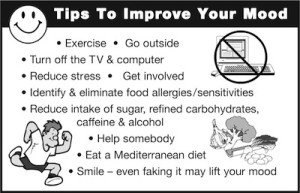
Holistic Happiness
by Mark J Kaylor
There is always the tendency when writing an all too brief article on a complex health matter to, frankly, treat it in a glib manner. Here take this pill or herb or nutrient, start or stop this behavior and all will be better. But the simple truth is depression does not work this way in the vast majority of individuals. Depression is different from person to person, between the sexes, race, and age groups as well. For instance, depression in the elderly tends to last longer and be more likely linked to suicide than among the young. Did you know that the suicide rate for those aged 85 (in whites) jumps an inconceivable 350% over those aged 65?
Depression is not one size fits all.
The label “depression” tells us nothing about the cause, it is simply a label attached to people experiencing a series of symptoms. Since there are many causes of depression, and it is usually multi-factorial, does it make sense that one drug or even one herb would cure this imbalance? On top of this Western medicine and researchers have a tendency to like to wrap things up in nice little packages or labels, such as “depression”. Depression like many other disorders, though doesn’t lend itself to such a nice categorization. Maybe we should at least call it depression syndrome.
Depression has always been with us. It is known by many names, black bile, melancholia, and the vapors. In the past many things supposedly caused it, from the moon to bad blood. While we are (hopefully) a bit more accurate with our causal attribution, we still do not know what the true, fundamental causes are. The precise chemicals and pathways that the current drugs act on in the brain have not been proven to be the cause of depression, nor have they been proven to cure it. (If you don’t believe me look at the research or just look at what their own packaging has to say.) The list of causes of depression is probably almost as long as the number of people experiencing it.
Where Do We Go?
Treatments, whether pharmaceutical, talk, or herbal, may only take you so far. What if the problem is that you are working in a job you absolutely hate or dread? Is treatment going to change the nature of your work? Maybe with a perspective change, it could affect the way you perceive it, but the drugs or herbs won’t change this. This is why finding the root cause or causes is essential for true healing, and why finding the right “remedies” makes all the difference in the world. No one remedy or even protocol will work for everyone.
Depression knows no bias: short or tall, black or white (and any color in-between), rich or poor. It can hit any of us.
Depression, possibly more so than any other imbalance, calls for, and may even require, a holistic approach. Why is this? The primary reason is that there is not a single cause of depression. There are numerous causes; including lifestyle, genetics, brain, stress, diet, connection, inflammation, nutrient deficiencies, and relationships to name but a few; and it involves such widely varied aspects of our lives, such as sex life, economics, job satisfaction, sexuality, and sunshine…. The key operative word though at the center for all of this is BALANCE.
Like disease it communicates to us that something is physically wrong and in need of correction. Depression lets us know that something is wrong that is affecting us mentally/emotionally. So in what direction does the healing path lie? Maybe our pursuit of health should take us along the path of correcting problems, removing thorns and encouraging balance.
While major depression is now defined as having “the blues” for more than two weeks, what if you just broke up after decades of living with your partner or spouse? What about losing a long held job in the current economy or the loss of a parent or child? Do these people need to be medicated? Are they suffering from a disease or imbalance we call depression?
There is Hope
The intent here is not to make you feel more depressed or overwhelmed but to suggest that depression is a complex, holistic imbalance that may be best treated from a place that acknowledges this realty: your body is just as much a product of your thoughts and emotions as it is of your diet and lifestyle.
Depression by its very nature is isolating but it is essential that you seek out help and support. What kind of practitioner or aid you seek out is obviously up to you, the key point though is that you seek out qualified assistance and guidance. Possibly the most important thing to know about depression is that it can be treated, there is hope at the end of that dark tunnel.
Start with Diet
One of the first things to explore is nutritional deficiencies and diet. The simple fact is that a number of nutrient deficiencies are associated with and may possibly even cause depression. From a diet that is sub-optimal to shortages of omega 3 fatty acids (specifically the omega 6 to omega 3 ratio), vitamin C, calcium, magnesium, zinc, trace minerals, and especially vitamin D, and the B vitamins: B1, niacin, folate, B6, and B12 (best taken along with a whole B complex).
The relationship between depression and diet is cyclical, with each contributing to issues with the other. If you eat badly, you are more likely to be depressed. If you are depressed, you are more likely to eat badly. This cycle goes round and round, with each one making the other worse. One diet that has been researched to help reduce the occurrence of depression is the Mediterranean diet, shown to lower the incidence of depression by 30%.
Nature to the Rescue
Nature also offers a wide selection of mood healing allies supporting a diverse array of healing actions and energies.
Balancing, to harmonize and re-establish fundamental balance: Rhodiola, Reishi, Cordyceps, Eleuthero, and Ginseng
Nervines, to nourish your nervous system: Wild or Green Oats, Nettle, Passionflower, B vitamins, and Skullcap
Adjuncts, to support the healing process: Ginkgo (circulation), Rosemary (circulation & uplifting), Valerian (sleep), Kava (anxiety)
Thyroid support, underactive thyroid often an overlooked contributor to depression: Guggul and Ashwagandha
Anti-depressants, to boost or support mood lifting chemicals and pathways:
St John’s Wort – chronic depression, previous research suggested only useful for mild to moderate depression but new study shows help for severe depression as well; promising recent research is focusing on its anti-inflammatory actions as key (Note; may interact with a number of pharmaceuticals so please check with your doctor first)
5-HTP – may elevate serotonin levels, help with sleeping, sleep apnea, aggression and anxiety, unlike SSRI pharmaceuticals, it works with the body
SAMe – comparable benefits to standard tricyclic anti-depressants but provides a more rapid response, best for non-motivated, lethargic depression, start with low doses and gradually increase if necessary (Note; has potential, particularly if dose is too high, to induce manic episodes in rare cases – usually decreasing dose eliminates)
Saffron – traditionally used to calm fright, double blind studies shows significant anti-depressant benefits
Black Cohosh – for doom and gloom and hormonally related depression
Night Blooming Cereus – depression with tightness in chest and lots of fear
Reishi – calms and nourishes the spirit
Albizzia – the “tree of happiness”, for moodiness and post-traumatic stress
Holy Basil – feeling as if you just aren’t going anywhere or overly fixated on a specific trauma
The Cure

While targeted nutrients, herbs and drugs can play an essential and effective role in achieving mental health, the long term “cure” lies in balancing and nourishing those aspects of our body and life that are the root of healing and radiant health. Our bodies respond differently when experiencing depression, even to everyday challenges. (Enlarge Image)
The most important point is to take a proactive position with regards to your depression/mood and overall health. Explore your options. Make the choices that are the most effective for you. Listen to your body, if it works great, if not, look for alternatives. Beware the miracle cures. Be pro-active. Don’t bury it. Seek out help and resources. Challenge those resources.
Remember, it’s your health and your healing, so get involved.

